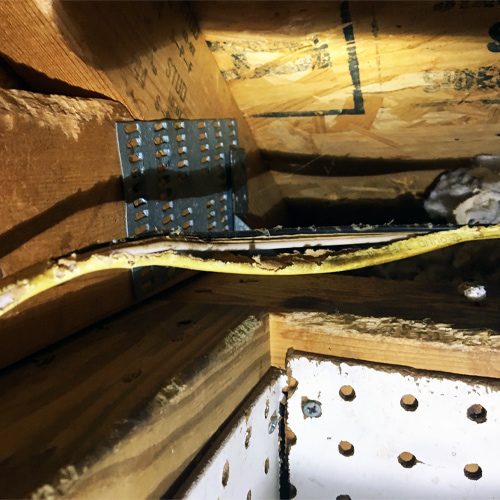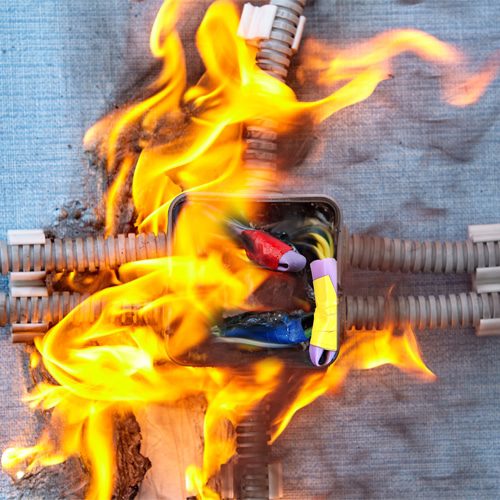How Do Electrical Fires Start?
Electrical fires are a scary thing. They ignite pretty easily and there are a lot of culprits around your home that can start one. Have you ever wondered, “How do electrical fires start?” If so, then you’re in the right place. Find out what an electrical fire is, how they start, and where one might be likely to occur – all in an effort to help you prevent an electrical fire in your home or office.
What Is an Electrical Fire?
An electrical fire is a broad term that applies to a fire that was caused by an electrical problem. Similar to how grease fires start with grease, electrical fires start with an appliance, wiring, circuitry, or cables.
How Do Electrical Fires Start?
There are two general ways that an electrical fire starts:
- A spark
- Overheating
A Spark
A spark happens when electricity doesn’t have a clear path of travel from its origin to the final destination. In this case, from an outlet to an appliance or electrical device.
Sparking starts a fire just like a lighter. You strike the wheel, a spark is caused, and the gas lights on fire.
Electricity is causing a spark. The source that lights on fire is wood, dust, paper, a wall, your floor – the list goes on and on. Anything flammable is fair game.
Overheating
Overheating occurs when a wire or electrical device gets way too hot. When things get too hot, they start to melt and wires begin to get exposed. If it gets hot enough, it can start a fire on contact like red-hot metal touching a sheet of paper. This is why overheating can be a problem.
Causes of Electrical Fires
A major cause of electrical fires has to do with bad wiring. Some of the common causes are:
- Frayed cords
- Loose wiring
- Poor insulation
- Undersized wires
- Faulty wires
In any of these cases, wires can get too hot, start sparking, create arcs, and ignite flammable material in the area. The main purpose of a wire is to safely deliver electricity from your wall’s outlet to a device like your toaster, for example. The problem arises when your outlet, wire, or toaster are defective. In fact, an issue in any three of these pieces to the puzzle can lead to a fire. When you’re looking specifically at lightbulbs, you’ll run into a potential fire-starter called “overlamping”.
Overlamping
Overlamping is a term that refers to a lightbulb overheating. Your lightbulb sockets have a certain amount of power they supply. The lightbulb itself has a certain amount of power that it takes.
If a lightbulb tries to take more than the socket can give, then the lightbulb heats up. This is an example of too much electricity coming through a wire that’s too small, creating a ton of heat. This phenomenon is called overlamping, and it can start an electrical fire.
Now that you’ve seen some of the reasons why an electrical fire starts, let’s dive into where you might see these fires take place.
Where Do Electrical Fires Take Place?
Here’s a breakdown of fire-starters that you might find around your house. Take a look around your house and see if you can spot any of these potential hazards before it’s too late.
Kitchen
- Toaster, fridge, blender, and other appliances
- Lights, lamps, and under-cabinet lighting
Living Areas
- Lamps and lights
- Faulty outlets, switches, and wires
- Too many items plugged into an extension cord
- Space heaters or AC units

Attic
- Old wiring
- Lights
- Fans
Basement
- Too many items plugged into an extension cord
- Washing machines, dehumidifiers, or old fridges
- Light fixtures and lamps
- Old wiring
In The Walls
- Faulty wiring in the walls or in your outlets
Circuit Breakers and Electrical Panels
- Faulty or old wiring in your electrical panels and circuit breaker
How to Prevent Electrical Fires at Home
There are so many places that can cause an electrical fire – where do you even start? Unlike Smokey the Bear and forest fires, electrical fires aren’t your responsibility alone to prevent.
The best way to prevent an electrical fire is to call a professional and trained electrician. They can replace faulty wiring, correct your light fixtures, and perform electrical inspections to keep you safe. here’s also hope if you’re looking to do some prevention on your own.
What can homeowners do to prevent electrical fires?
While you’re waiting for the electrician to show up, there are a few tips to keep in mind:
- Never run wiring under carpets – the wires may overheat.
- Use heavy-duty extension cords so they aren’t undersized.
- Extension cords are a temporary solution. Never use them for long-term applications.
- If you have a cord, outlet, lightbulb, switch, or appliance that’s abnormally hot – call an electrician for emergency service. Ask them on the phone how you can turn off the breaker to that area, so you don’t have a fire while you wait for them to arrive.
- Update your old appliances by replacing them.
- Check the wattage rating on your lightbulbs and compare them to the posted max wattage on/next to your lightbulb socket.
- Ensure all plugs are completely plugged in. You should never see the metal prongs when something is plugged into an outlet.
- Immediately dispose of and replace any wires that are frayed.
It might not be preventative, but it’s a good idea to have new and working smoke detectors around your home. They can alert you if an electrical fire started.
How do circuit breakers help prevent electrical fires?
Have you ever tripped your circuit breaker and gotten mad about it? Well, it could have prevented a fire. Circuit breakers are the middleman between the source of electricity and an outlet in your wall. If you imagine three people holding hands in a row, the circuit breaker is the lucky fella in the middle.
If your outlet tries to take too much electricity, gets too hot, or poses a risk of a fire, the circuit breaker should immediately cut off the connection to the power source. In other words, the person in the middle stops holding hands with the other two people.
This immediate break in the chain stops things before they get too bad. If circuit breakers weren’t installed, outlets could overheat, spark, and cause fires. An electrician can also check out your circuit breakers when they come out to inspect your home.

When (or how often) should a homeowner have an electrician out to inspect?
If you have an older home, you should bring in an electrician every three to five years. Homeowners of newer homes can go about 10 years before calling an electrician – as long as nothing is electrically wrong in the meantime.
If any part of your electrical system ever seems suspicious, gets hot, or smells like it’s burning, call an electrician immediately. Have them come out and inspect your wiring to minimize your risk of an electrical fire. Take a look at these 10 common electrical issues in your home to better understand what to look for.
What’s Next?
There are a lot of problems that can cause an electrical fire. Faulty wiring, overheating, and poor insulation could potentially be found in almost every room of the house. The best way to prevent an electrical fire is to bring in a professional electrician. Our team at Rytec is here to help. Give us a call or schedule an appointment with us online today!

